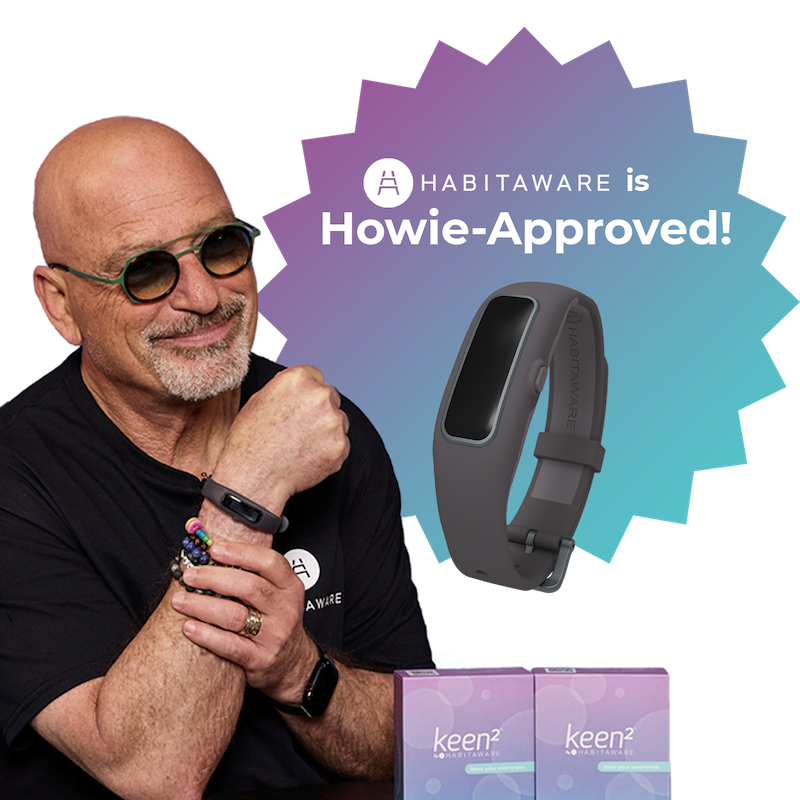This article was written by our summer intern, Dureti Doto. Thank you Dureti for sharing your personal experience and knowledge with us all!
My name is Dureti Doto and I have been working at HabitAware this summer as an intern. Before I learned about HabitAware, I did not know what body focused repetitive behaviors (BFRBs) were but I quickly learned that this disorder is something many people struggle with around the world. My values aligns with HabitAware’s mission of increasing awareness, reducing stigma, and helping compulsive nail biters, skin pickers and hair pullers who think they are alone in their mental disorder journey. As a Neuroscience major I was also intrigued to understand how HabitAware’s Keen awareness bracelet helped “retrain your brain.” I personally struggle with anxiety and I wanted to work for a team whose goal was to change the lives and mental healthiness of people around the world. For these reasons I eagerly joined the HabitAware team this summer!

My experience at HabitAware is eye opening, empowering and challenging in many ways. In doing more research, I have a better understanding of how BFRBs affect the emotional and mental state of people suffering from these debilitating disorders. I learned many people self-stigmatize themselves, which affects them in ways that they do not realize. But, self stigmatization doesn’t just affect the BFRB community, it affects almost everyone with a mental disorder.
I know this because it also affected me.
I grew up in a family that doesn’t believe in mental health disorders, or taking care of your mental health. I internalized the things my family said to me and allowed it to impact my life negatively. I remember a time when I had an anxiety attack and I couldn’t breath. When I told my father what was happening to me, he told me that it was all in my head and I needed to just get over it. He always would tell me that mental disorders weren’t real and that I was just crazy, and I believed him even though I didn’t want to. I felt crazy, alone and because of that didn’t try to get the help I needed.
““Change in mindset, changed my life.”
I will be entering my senior year at Macalester College this fall, but I did not fully acknowledge that my anxiety until my junior year. College is stressful and for someone with anxiety, taking exams were the most anxiety inducing times for me. I didn’t know how tell my professors that I needed more time for my exams and that taking an exam in a room full of other students gave me anxiety. I felt helpless and felt that I was dumber than all of my classmates when in reality I just needed a better testing environment. Until one day, I was talking to a close staff member and without realizing it, I told her what I was going through. This thoughtful teacher quickly connected me to a resource at Macalester called the MAX Center. At the MAX center, I was able to take the exam in a quiet room and was allowed more time to finish my exams. I was a little hesitant to take my exams at the MAX center at first because I was afraid of how others would perceive me when I told them I needed accommodations for testing. To get over that fear of judgement I changed my mindset and told myself over and over that it really doesn’t matter what other think of me, even my own family.
This change in mindset changed my life.
Getting testing accommodations was one of the best things I’ve ever done for myself, and I wish I had done it earlier in my college career. Once I stopped internalizing what others had to say about my anxiety and acknowledged that I deserved to get the help I needed, it changed the way I saw myself and ultimately how others saw me. I silenced the stigma soundtrack and changed how I talked about myself when I was around other people. I stopped letting myself say “I am just dumb.” As I started changing the way I talked about myself, my classmates also started to say more positive things about me too! I was no longer seen as the girl who was hindered by her anxiety. I was seen as someone who decided to take control of her destiny!
When we think of stigma, we tend mostly to think of social stigma – the negative assumptions and judgements that other people make about us. For example, when someone with a BFRB tries to share and open up to a loved one, they are often met with “Ew that is gross.” and “What is wrong with you…Why can’t you just stop!?” Their lack of understanding shows in their presumptive responses. These stigmas can silence someone for a really long time, forcing their disorder into hiding and starting a negative track on repeat in our minds.
And yet, as harmful as external stigmas are, something even more detrimental to one’s mental health is self stigma. Self stigma is occurs when someone starts to believe and internalize the negative things that are said about them and allows it to have a negative impact in their life. When you have a mental disorder, listening to and internalizing the negative judgements people share about you is like breathing in polluted air: toxic.
Self stigma can cause:
- Distress, anxiety, depression
- Eroding of self-efficacy, self-esteem, agency, making you feel bad about yourself and who you aspire to be
- Social isolation to avoid showing your disorder and to avoid judgement from others and
- Disregarding mental health services, resources, and professional treatment to avoid being shamed
Though I’ll never fully truly understand, since I do not have a BFRB myself, I have seen some common “self stigmatization” themes. One that seemed to keep popping up is that people with BFRBs think they are flawed and ugly in some way because of the physical effects of the hair pulling, skin picking, nail biting or other behaviors. Stephanie, in our Keen Family, feared going out in public because she thought everyone would talk about her:
“I wanted to wear my hair up in cute styles even outside of school and clinicals, but it was embarrassing. I felt isolated from my peers because I thought everyone could see it and was talking about me. I did not want to go out in public and I felt ashamed of myself for not being able to “just stop” pulling my hair out. My mother was concerned and kept telling me to just stop and I told her numerous times that it was not that simple, but I knew she did not understand.” — Stephanie
Another theme I noticed is a feeling of not being normal. Like it’s your fault you are going through this disorder! It pains me to see that so many feel lost and that nothing and no one can fix them because it means they aren’t seeking out the professional mental health help they deserve. These beliefs can lead people with BFRBs to think lesser of themselves and to deny themselves a good life. Keen family member, Adrienne, let the physical effects of hair pulling stigmatize her intelligence. How could she be smart if she was doing this “weird” thing!? But then she used Keen and other tools in her tool kit to silence this self-stigma soundtrack with her “self-care alarm” (Keen)!
“My kids never had playdates because I hated being around other parents whose very proximity to me reminded me that my life still felt like a wreck. My career suffered. I put up with a job that was beneath my skill level working for a boss who loved to humiliate me. But, I didn’t feel like I could present myself as a candidate for a better job the way I looked. I rarely dated for similar reasons.” — Adrienne
< Get your Keen “self-care alarm” and silence the self-stigma soundtrack TODAY! >
By being aware and trying to understanding that others’ judgements are not self-judgements, you can take the first critical step to breaking the stigma you place on yourself by way of the stigma others place on you.
Here are a few ways to silence the self stigma soundtrack:
-
Knowledge Up – The more truths you know about your disorder, the less impact others’ lies will have on you. You can educate yourself about your body focused repetitive behavior here.
-
Seek Professional Help – Talk to a doctor educated on the disorder you have to get the best advice.
-
Get Personal Support – Join an online or in person support group to share your struggles with others. You are NOT alone in this!
-
Nix Self-Stigma with Affirmation – When you catch yourself in a negative thought cycle, use a journal to remind you how great you are, or use these affirmations:
- I am healthy and strong today.
- I am strong and confident.
- I am deserving of everything good in this life.
- I am worth it.
- I am love.
- I am growing into the person I want to be.
- I am beautiful and whole within myself.
- I am unstoppable.
- I am in the process of positive changes.
My favorite is the journaling. Right before a big exam, I scribble down all the ways I’m great before entering the MAX center to take my test in peace.
Because stigma’s has nothing on me and I hope you know now that it has nothing on you too!
< See how our Keen Family is winning against stigma: Keen by HabitAware bracelet reviews >


